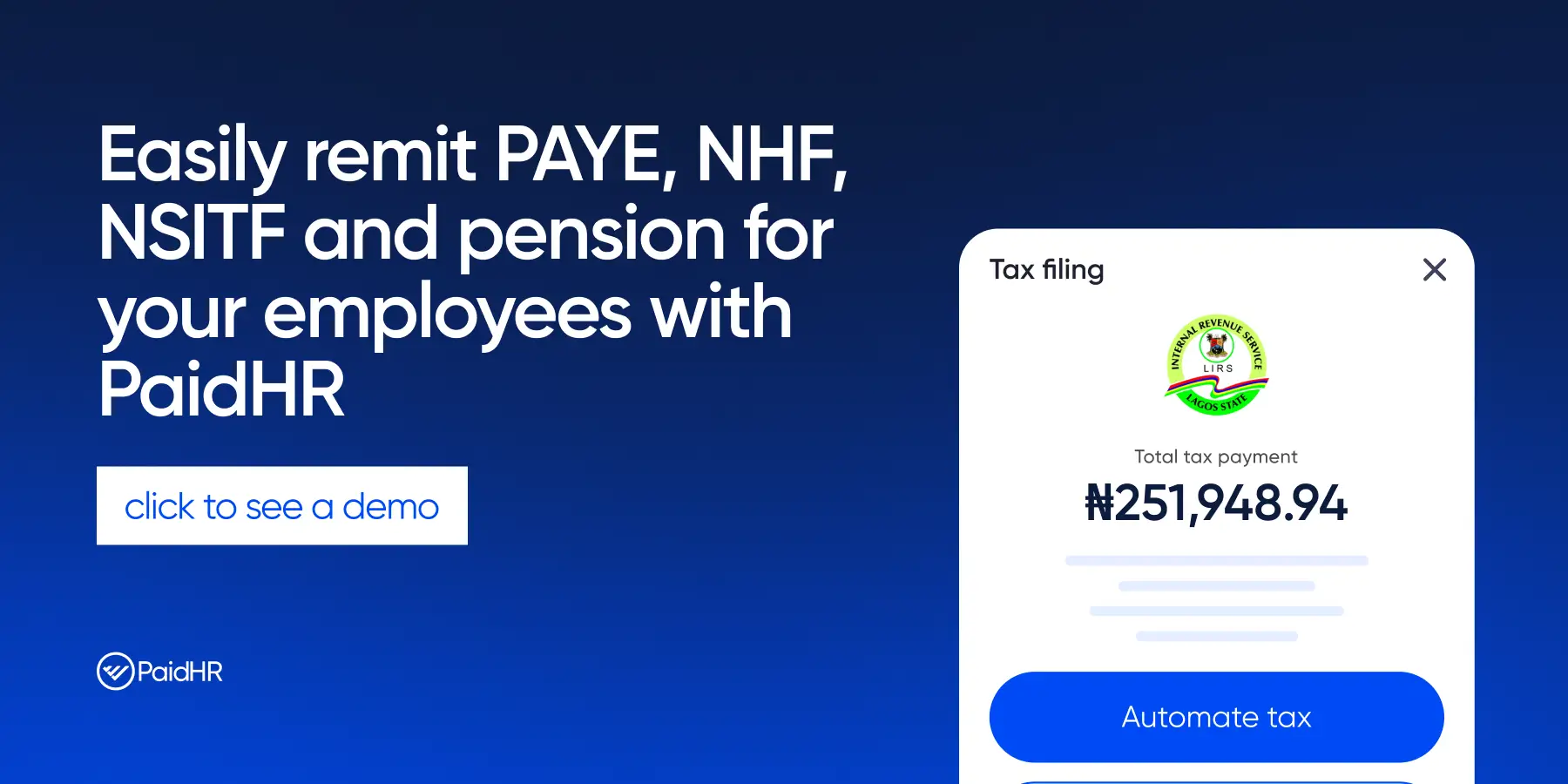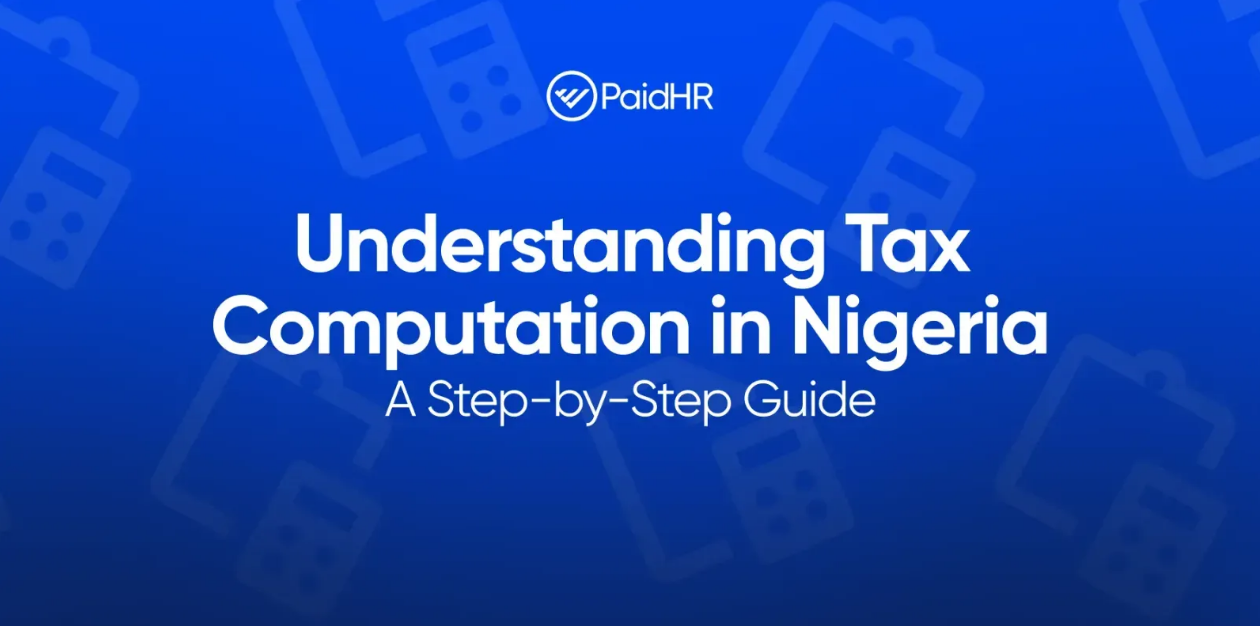“Does the government plan to finish my salary with taxes?”
“How much is even my take-home?”
“Are banks still safe like this?”
If you’ve asked yourself these questions recently, you’re not alone. With the new tax laws being effective in January 2026, a lot of Nigerians are trying to figure out what exactly changes and how it affects their payslips.
Whether you’re an employee trying to make sense of your payslip or an employer ensuring accurate payroll deductions, understanding how to calculate tax on your salary in Nigeria can be confusing, especially with different deductions like pension contributions, relief allowances, and tax bands.
I have felt this way too. Well, until I stayed in a room with the Customer Support team, who did a great job at explaining the complexities of tax calculation in Nigeria.
It seems all unfair, but when you read this, you will understand more and even feel relieved.
I’ll break it down step by step in simple terms. Plus, for HR professionals, I’ll show you how PaidHR makes the process easy so you never have to stress about payroll calculations again.
First, what are taxes?
Taxes are compulsory payments made by individuals and businesses to the government.
They can be levied on various things, including:
- Income: Taxes on personal income, such as salaries and wages
- Wealth: Taxes on property, investments, and inheritances
- Consumption: Taxes on goods and services, like sales tax or value-added tax (VAT)
- Transactions: Taxes on specific transactions, such as taxes on imports(tariffs)
So, everyone pays their taxes one way or the other, but for the sake of this article, we will concentrate on income taxes.
Key Components of Income Tax in Nigeria
Four key elements constitute an employee’s income tax in Nigeria, and they are;
- Personal income tax (PIT)
- Pay As You Earn (PAYE)
- Tax Reliefs and Allowances
- Company Income Tax (CIT)
Personal Income Tax (PIT)
This is the tax levied on an individual’s earnings, whether from employment, business, or other sources.
It applies to all residents and is now regulated under the Nigeria Tax Act (NTA) 2025, which replaces the former Personal Income Tax Act (PITA).
Pay As You Earn (PAYE)
This is the mandatory system where employers deduct income tax from employees’ salaries before payment and remit it to the government.
The amount deducted depends on Nigeria’s revised progressive tax system, where different tax rates are applied to specific income bands.
The national tax table has been updated with new bands and rates to ensure a more progressive collection method.
Tax Reliefs and Allowances
These are mandatory deductions that reduce an employee’s taxable income. The Consolidated Relief Allowance (CRA) is abolished under the new law. In its place, a Rent Relief is introduced.
Other statutory deductions, such as contributions to Pension, National Housing Fund (NHF), and National Health Insurance Scheme (NHIS), still apply and are deductible from an employee’s income before tax calculation.
It is important to note that NHF is not compulsory for private employees, and instead of the NHIS, private employees use what is known as Health Maintenance Organisation (HMO), which may or may not be among the statutory deductions, as this is left to the employer’s discretion.

Company Income Tax (CIT)
While this is a tax on company profits, it remains a component that indirectly affects employees since businesses must comply with tax regulations, which influence salary structures, benefits, and the overall financial health of the employer.
CIT is still paid by the company, not the employee. The new law has updated thresholds for small companies (now exempt) and introduced a Development Levy for medium and large companies.
Understanding the Key Tax Changes
Before we explore tax computation in Nigeria, here are some statements to take note of based on the recent tax reform bill.
In June 2025, President Bola Ahmed Tinubu signed four new tax laws that will start applying from January 2026. The most important one for individuals is the Nigeria Tax Act (NTA 2025).
Here’s what you need to know in simple terms:
- If you earn ₦800,000 or less per year, you won’t pay any income tax.
- The old Consolidated Relief Allowance (CRA) is gone. It’s been replaced with a Rent Relief. You now deduct 20% of your annual rent, but capped at ₦500,000. If you don’t pay rent (you own your house, live rent-free, etc.), you don’t get that relief.
- Your pension contribution (usually 8%) is still deductible.
- The new tax rates are still progressive, meaning the more you earn, the more tax you pay. They now range from 0% to 25%
- For companies, the new exemption threshold is raised to ₦100 million in annual turnover. Small companies with a gross annual turnover of ₦100 million or less and total fixed assets not exceeding ₦250 million are now fully exempt from Corporate Income Tax (CIT), Capital Gains Tax (CGT), and the new Development Levy.
- Worldwide income for residents. Remote work and foreign income now come into the tax net if you are a resident in Nigeria.
- Crypto and digital assets are taxable. Gains from digital or virtual assets are now included under taxable income.
- E-invoicing, VAT and digital compliance. VAT remains at 7.5%, but essentials are zero-rated and input VAT recovery is expanded. Digital platforms are now more clearly taxed.
To pay taxes in Nigeria, you must first obtain a Taxpayer Identification Number (TIN). This is a requirement mandated by the Nigeria Revenue Service (NRS) (formerly FIRS) to ensure tax compliance.
How to Calculate Tax on Your Salary in Nigeria
Let’s do a breakdown on the computation of tax (PAYE) calculation in Nigeria so you can try it on your own if you’d like to:
Step 1: Find the Annual Gross Income
Gross income is the total amount you earn before any deductions. It includes your basic salary, housing allowance, transport allowance, and any other benefits.
Net income is your take-home pay, the amount left after pension, tax, and other deductions have been made.
So, using our example of someone who earns five hundred thousand naira per month, the annual gross income is;
₦500,000 × 12 months = ₦6,000,000 per year
Step 2: Deduct Pension Contributions (8% of Annual Gross Income)
The first deduction is for your pension, which is 8% of your gross income.
This goes to your retirement savings and is legally required by the government. Think of it as investing in your future. Nobody wants to work until they are old and frail.
Using our example:
8% of ₦6,000,000 (Gross income) = ₦480,000
This amount goes to your pension fund, not the government.
Remaining income after pension has been deducted:
₦6,000,000 − ₦480,000 = ₦5,520,000
The good news? Your employer also contributes 10% to your pension, but that doesn’t affect your take-home pay. It’s just extra savings for your future self.
Step 3: Apply Rent Relief (20% of Annual Rent if applicable)
Under the new tax law, the Consolidated Relief Allowance (CRA) has been replaced by a Rent Relief.
This allows taxpayers to deduct 20% of their annual rent, capped at ₦500,000, from their taxable income.
Understanding this part of tax (PAYE) computation in Nigeria can feel a little tricky, but it’s a relief that helps lower your overall tax burden.
This means:
- If your rent is ₦2,000,000 per year, you can claim ₦400,000 as relief (20% of ₦2,000,000).
- If your rent is ₦3,500,000 per year, you can only claim ₦500,000, even though 20% of that is ₦700,000, because ₦500,000 is the maximum allowed.
Therefore, not everyone will have the same deductions. Someone who pays rent gets a little more relief, while someone who doesn’t will have a slightly higher taxable income.

Let’s use two examples to show how this works.
Example A (With Rent Relief):
If you earn ₦500,000 monthly and pay ₦2,000,000 rent per year:
- 20% of ₦2,000,000 = ₦400,000 (rent relief).
- ₦400,000 is deducted from your gross income.
₦5,520,000 – ₦400,000
= ₦5,120,000.
Example B (Without Rent Relief):
If you do not pay rent (e.g., you live in your family house or own your home), you simply skip this step. Your taxable income will not include any rent deduction.
Step 4: Determine Taxable Income:
Before we calculate your salary tax, it’s important to know what part of your income is taxed.
Your taxable income is the final amount used to calculate tax on your salary after statutory deductions have been made.
Continuing from examples in the last step;
Example 1: Someone who pays rent
If a person earns ₦500,000 per month (₦6,000,000 per year) and pays ₦2,000,000 in annual rent:
- Pension contribution (8%): ₦40,000 per month × 12 = ₦480,000
- Rent relief: 20% of ₦2,000,000 = ₦400,000 (below ₦500,000 cap)
Total taxable amount = ₦6,000,000 – ( ₦480,000 + ₦400,000)
= ₦5,120,000
That means ₦5,120,000 of this person’s annual income will be taxed.
Example 2: Someone who doesn’t pay rent
If this second person earns the same ₦500,000 monthly salary but lives in her family home and doesn’t pay rent:
- Pension contribution (8%): ₦480,000 per year
- Rent relief: ₦0
Total taxable income = ₦6,000,000 – (₦480,000 – ₦0)
= ₦5,520,000
So, this person’s taxable income is higher because of no rent relief.
Now that we have determined the taxable income, let’s examine the progressive tax bands, a crucial step in the tax calculation in Nigeria.
Step 5: Apply the Progressive (PAYE) Tax Bands
Nigeria uses a progressive tax system. This simply means you do not pay ONE tax rate. Different parts of your income are taxed at different percentages.
Here is the monthly PAYE tax calculator in Nigeria:
| Tax band (Annual income) | Tax rate |
| First 800,000 | 0% |
| Next ₦2,200,000 | 15% |
| Next ₦9,000,000 | 18% |
| Next ₦13,000,000 | 21% |
| Next ₦25,000,000 | 23% |
| Above ₦50,000,000 | 25% |
This table and calculation confuses most people, but here is the simplest way to explain it:
The government has already divided income into fixed tiers, think of it like climbing a ladder. It does not mean you personally must have exactly ₦2,200,000.
It means after the first ₦800,000 of your income has been accounted for, the next portion (up to ₦2,200,000) is taxed at 15% and so on. If your taxable income goes beyond that portion, then you move into the next layer.
Now that we’ve determined the taxable income, let’s see calculate salary tax for both examples under the new system.
Example 1: Pays rent (Taxable Income: ₦5,120,000)
- This person’s annual tax is calculated by applying the progressive rates to the different income bands.
- First ₦800,000: 0% = ₦0
- Next ₦2,200,000 at 15% = ₦330,000
- Next ₦9,000,000 at 18% = ₦381,600
- Total Annual Tax: ₦0 + ₦330,000 + ₦381,600 = ₦711,600
- Monthly PAYE: ₦711,600 ÷ 12 = ₦59,300
Example 2: Does not pay rent
The taxable income after deductions is ₦5,520,000
- First ₦800,000: 0% = ₦0
- Next ₦2,200,000 at 15% = ₦330,000
- Next ₦9,000,000 at 18% = ₦453,600
- Total Annual Tax: ₦0 + ₦330,000 + ₦453,600 = ₦783,600
- Monthly PAYE: ₦783,600 ÷ 12 = ₦65,300
So anyone who doesn’t enjoy rent relief will end up paying slightly higher tax than the people who pay rent.
If you are wondering about the due date for remitting PAYE monthly in Nigeria, it is on or before the 10th day to the State Board of Internal Revenue (SIRS), which is simply the state you reside in.
Step 6: Sum Up the Total Tax
After applying the tax bands, here’s the summary:
- A person who pays rent will pay a total annual tax of ₦711,600 (₦59,300 per month)
- The person who does not pay rent pays a total annual tax of ₦783,600 (₦65,300 per month)
How Does PaidHR Automate Tax (PAYE) Calculation in Nigeria
Now, imagine doing this for every employee, every month, manually. It’s time-consuming, prone to errors, and stressful.
That’s where PaidHR comes in. It:
- Automatically calculates PAYE tax based on Nigerian tax laws keeping you compliant effortlessly.
- Deducts pension, NHF, and other statutory contributions automatically.
- Generates payslips with clear breakdowns.
- Helps businesses stay compliant with FIRS and state tax regulations.
With PaidHR, you eliminate errors, save time, and ensure accurate payroll processing every time. You can read more about payroll processing in Nigeria, and if your employees are in different states of the country, this guide will help you.
Tax Compliance with PaidHR
Understanding tax (PAYE) calculation in Nigeria is crucial, but you don’t have to stress over calculations every month.
Whether you’re an employer managing multiple salaries or an employee curious about your take-home pay, PaidHR ensures accuracy and compliance without the headache.
Want to simplify PAYE calculations?? Let PaidHR handle it for you. Request a demo.
Quick FAQs About the 2026 Tax Changes in Nigeria
1. What if I don’t pay rent?
Then you won’t get rent relief. Your taxable income will just be your gross minus pension.
2. When does this new law start?
It takes effect from January 2026. The 2025 tax year still follows the old system.
3. Who doesn’t have to pay tax?
Anyone earning ₦800,000 or less per year.
4. What about small businesses?
Small companies earning ₦100 million or less per year are exempt from Company Income Tax.
5. Will PaidHR update automatically?
Yes. PaidHR’s system will apply the new 2026 tax rules once they take effect.
6. If I work remotely for a foreign company from Nigeria, do I pay Nigerian tax?
Most likely yes. If you are a tax resident in Nigeria (residence rules now include people with strong economic or family ties).
You must declare worldwide income, including earnings from foreign clients or platforms, and pay tax in Nigeria unless you are taxed abroad and can claim relief under a treaty.
Employers and freelancers should register with their state tax office and obtain a TIN.
7. Are crypto gains taxable?
Yes, the reforms make it clear that digital transactions are within the tax net.
Profits from crypto trading will be taxed under the personal income tax rules (for individuals) or under corporate/CGT rules (for companies/exchanges).
Expect stronger reporting and enforcement. If you trade crypto, keep records and consult a tax advisor.
8. What is rent relief and who gets it?
Rent relief is a new deduction allowing tenants to deduct 20% of annual rent paid, up to ₦500,000.
You must be able to prove rent paid (receipts, tenancy agreement). Homeowners who do not pay rent will not benefit from this.
9. Is CRA still available?
The Consolidated Relief Allowance structure has been abolished and replaced by the rent relief approach. Update payroll logic accordingly.
10. Will VAT apply to digital services and online platforms?
Yes, the VAT scope has been expanded to cover digital services.
VAT stays at 7.5% but essentials are zero-rated; the law also introduces VAT fiscalisation and mandatory e-invoicing to improve reporting and collection.
Businesses should prepare for e-invoicing and input VAT recovery rules.
11. When do these changes apply ?
The Acts were signed in June 2025; many changes become effective in the 2026 fiscal year (January 2026).
Some platforms (e-invoicing) have already phased rollouts in 2025, and enforcement will increase as systems come online.






